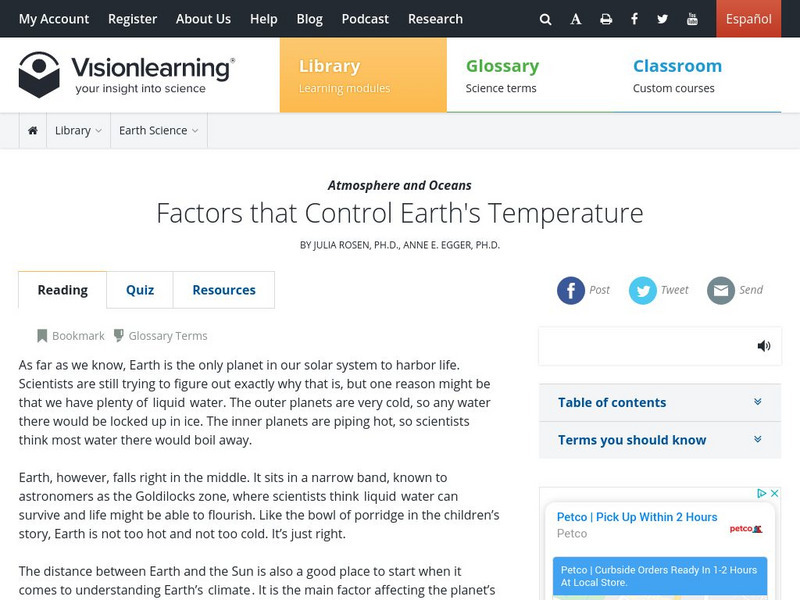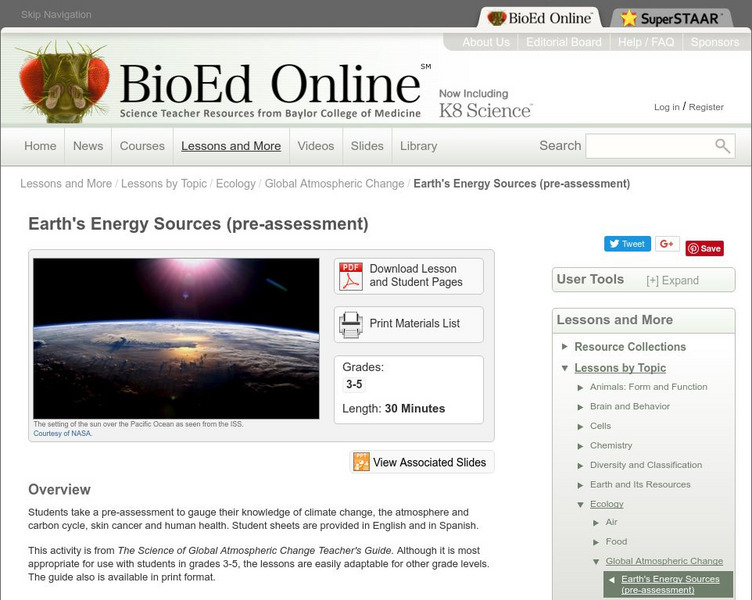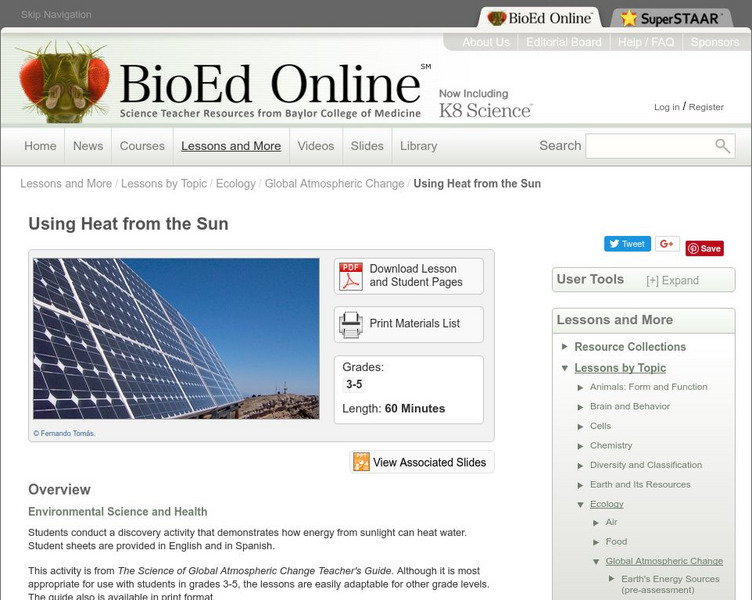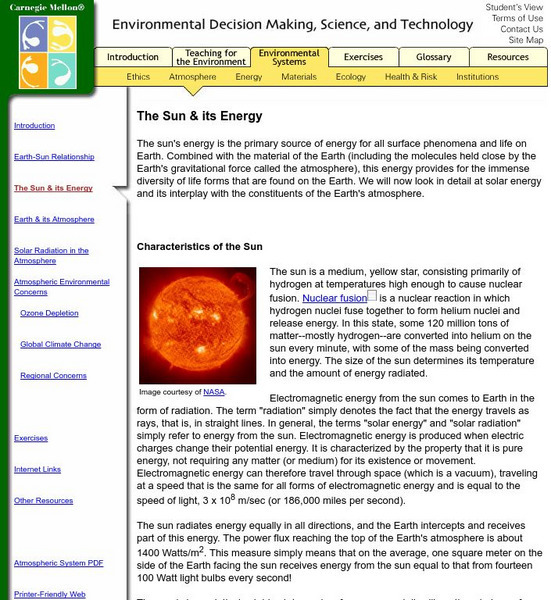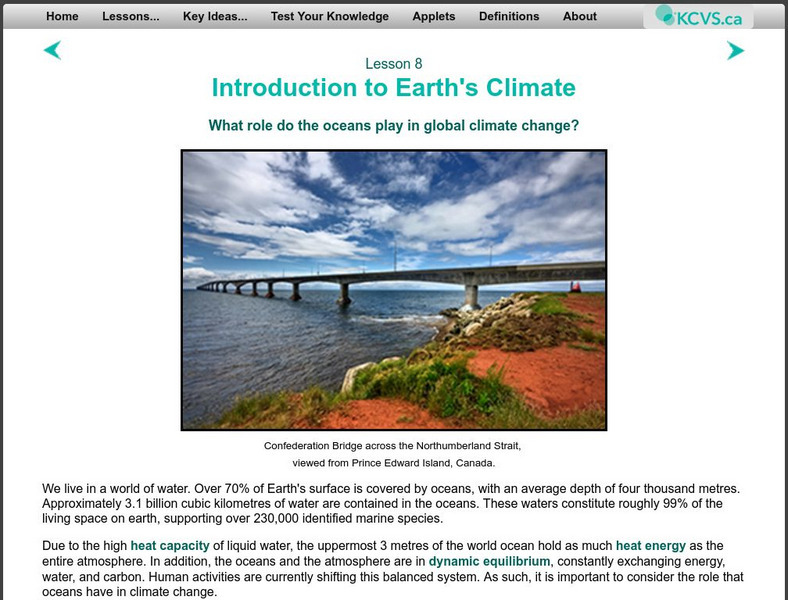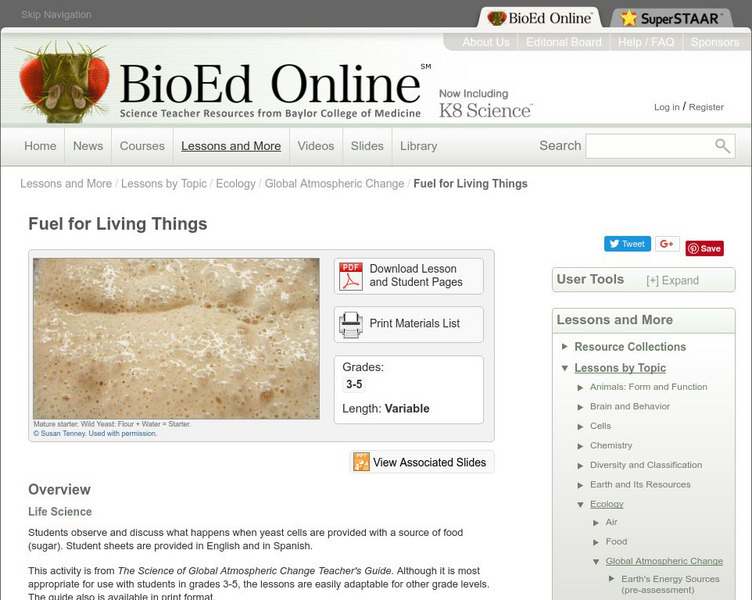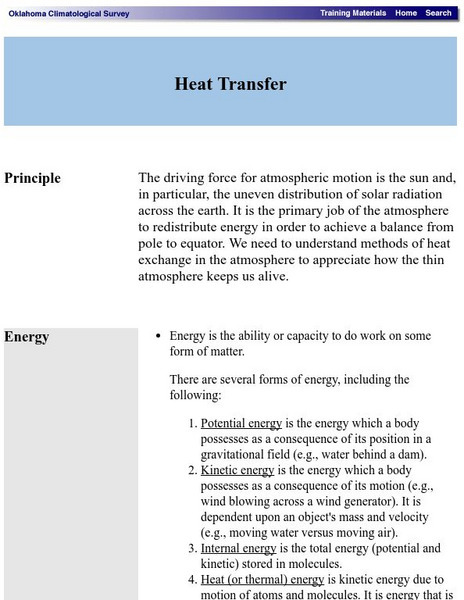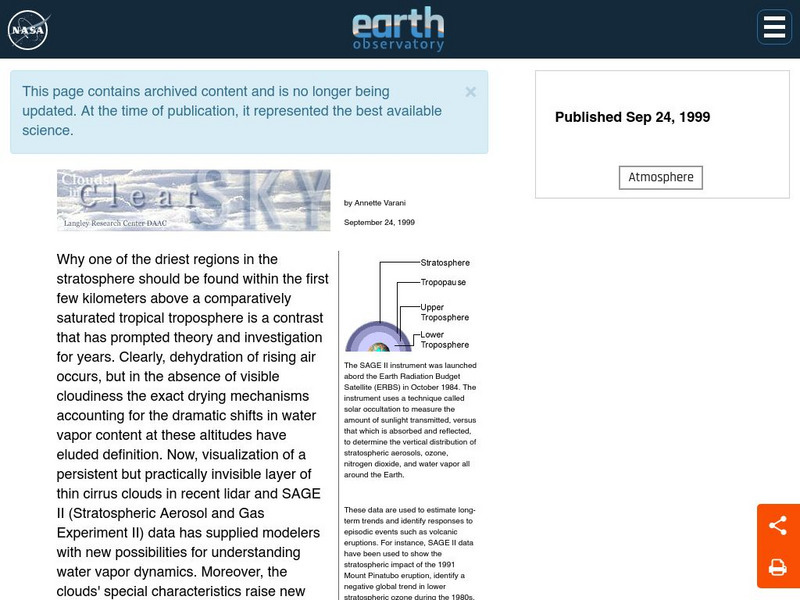Hi, what do you want to do?
Vision Learning
Visionlearning: Atmosphere and Oceans: Factors That Control Earth's Temperature
An explanation of how temperature is affected by the composition of the atmosphere and how energy flows in and out of Earth's atmosphere.
University Corporation for Atmospheric Research
Ucar: Plugged in to Co2
Learners analyze the energy consumption of a household appliance and estimate the amount of carbon dioxide it is adding to the atmosphere each year.
Other
Few: Human Impact on the Environment & Environmental Impact on Humans
Human beings have an enormous impact on the natural environment, and ultimately on each other. The way we chose to house, clothe, shelter, and meet the needs for vital resources such as food, energy, and water, not only affect the...
Exploratorium
Exploratorium: Global Climate Change: Atmosphere
Use this site to explore real scientific data relating to the atmosphere. With this information you can gather evidence, test theories, and come to conclusions. Click on the data examples to view a full scale version.
Open Curriculum
Open Curriculum: Into the Mitochondrion: Making Atp With Oxygen
The aim of this article is to relate the history of oxygen in the atmosphere to the evolution of photosynthesis, aerobic respiration, mitochondria, and life on earth.
PBS
Pbs Learning Media: Prairie Public Education Services Collection
Prairie Public Education Services award winning documentaries on Germans from Russia focus on the rich history of Germans from Russia and their migration to America. Indian Pride, the 13-part cultural magazine, showcases the unique...
National Geographic
National Geographic: Interactions Within Earth's Atmospheres
Using computational models, students investigate the interaction between greenhouse gases, solar radiation, and the Earth's surface for the impact on climate. They then look at data on atmospheric carbon dioxide to analyze changes in...
BioEd Online
Bio Ed Online: Earth's Energy Sources (Pre Assessment)
A pre-assessment at the beginning of a unit on global atmospheric change. It checks understanding of issues around climate change and the impact it has on the environment and on human health. The lesson and accompanying slideshow can...
BioEd Online
Bio Ed Online: Using Heat From the Sun
Learners investigate how solar energy can be harnessed to heat water. The lesson and accompanying PowerPoint can both be downloaded, and the student handout is provided in both English and Spanish.
Massachusetts Institute of Technology
Mit: Open Course Ware: Courses: Civil Environmental: Ecology I: The Earth System
College-level online course highlighting the fundamentals of ecology. Course topics include coevolution of the biosphere, geosphere, atmosphere, and hydrosphere; photosynthesis and respiration; and the carbon, nitrogen, and water cycles....
BioEd Online
Bio Ed Online: Finding the Carbon in Sugar
Students learn that fossil fuels release energy when they are burned, and this takes the forms of light, heat, gases, etc. In this instructional activity they explore combustion with a candle and with sugar. The instructional activity...
Carnegie Mellon University
Telstar: The Sun and Its Energy
The sun's energy is the primary source of energy for all surface phenomena and life on Earth. Combined with the material of the Earth (including the molecules held close by the Earth's gravitational force called the atmosphere), this...
Florida State University
Florida State University: Magnet Lab: Atmospheric Pressure Photoionization (Appi)
In the APPI technique, UV light photons are used to ionize sample molecules.
Cosmo Learning
Cosmo Learning: The Atmosphere, the Ocean, and Environmental Change
A collection of video lectures from a course that explores the physical processes the control Earth's atmosphere, ocean, and climate that is taught at Yale University. The course covers topics like clouds, rain, severe storms, regional...
King's Centre for Visualization in Science
Explaining Climate Change: Lesson 8: Climate Change and the Oceans
This is the eighth lesson in a series of learning modules on the topic of climate change. It explores the role that oceans play in global climate change. Includes comprehension questions and interactive tools for understanding the...
BioEd Online
Bio Ed Online: Fuel for Living Things
Learners learn about how cells fuel themselves by examining how carbon dioxide is produced by yeast cells when the cells feed on sugar. The carbon dioxide is detected through the use of a red cabbage indicator that reacts in the presence...
CPALMS
Florida State University Cpalms: Florida Students: Photosynthesis
Be able to explain how sugar is produced by capturing carbon in the atmosphere by completing this tutorial. Also learn the major molecules and their roles in photosynthesis.
Oklahoma Mesonet
Oklahoma Climatological Survey: Heat Transfer
A discussion from the Oklahoma Climatological Survey of the thermal factors effecting the movement of air masses in the atmosphere. Numerous topics such as methods of heat transfer, latent heat, phase changes (including sublimation and...
Howard Hughes Medical Institute
Hhmi: Bio Interactive: Paleoclimate: A History of Change
Learn about the history of Earth's climate in this Click and Learn. Learn how many factor control Earth's climate. Specifically, examine two of the most important factors: solar radiation and the composition of Earth's atmosphere.
Other
Digital Library for Earth System Education: Teaching Box: Essentials of Weather
A suite of lessons focusing on the basic elements of climate and weather. Inquiry-based exploration of extreme weather events and the factors of weather including clouds, wind, air pressure, temperature, and the water cycle.
Carnegie Mellon University
The Sun and Its Energy
The sun's energy is the primary source of energy for all surface phenomena and life on Earth. Combined with the material of the Earth (including the molecules held close by the Earth's gravitational force called the atmosphere), this...
NASA
Nasa Earth Observatory: Clouds in a Clear Sky
This article introduces the different layers of the atmosphere and the clouds that are formed there. Scientists use instruments such as the SAGE 11 that help to measure amounts of sunlight, water vapor, and other conditions that affect...
NOAA
Noaa: Weather Systems and Patterns
Imagine our weather if Earth were completely motionless, had a flat dry landscape and an un-tilted axis. This, of course, is not the case; if it were, the weather would be much different. The local weather that impacts our daily lives...
NASA
Nasa Star Child: The Hubble Space Telescope (Level 1)
This article for younger students introduces the Hubble Space Telescope and what it is doing in outer space.





